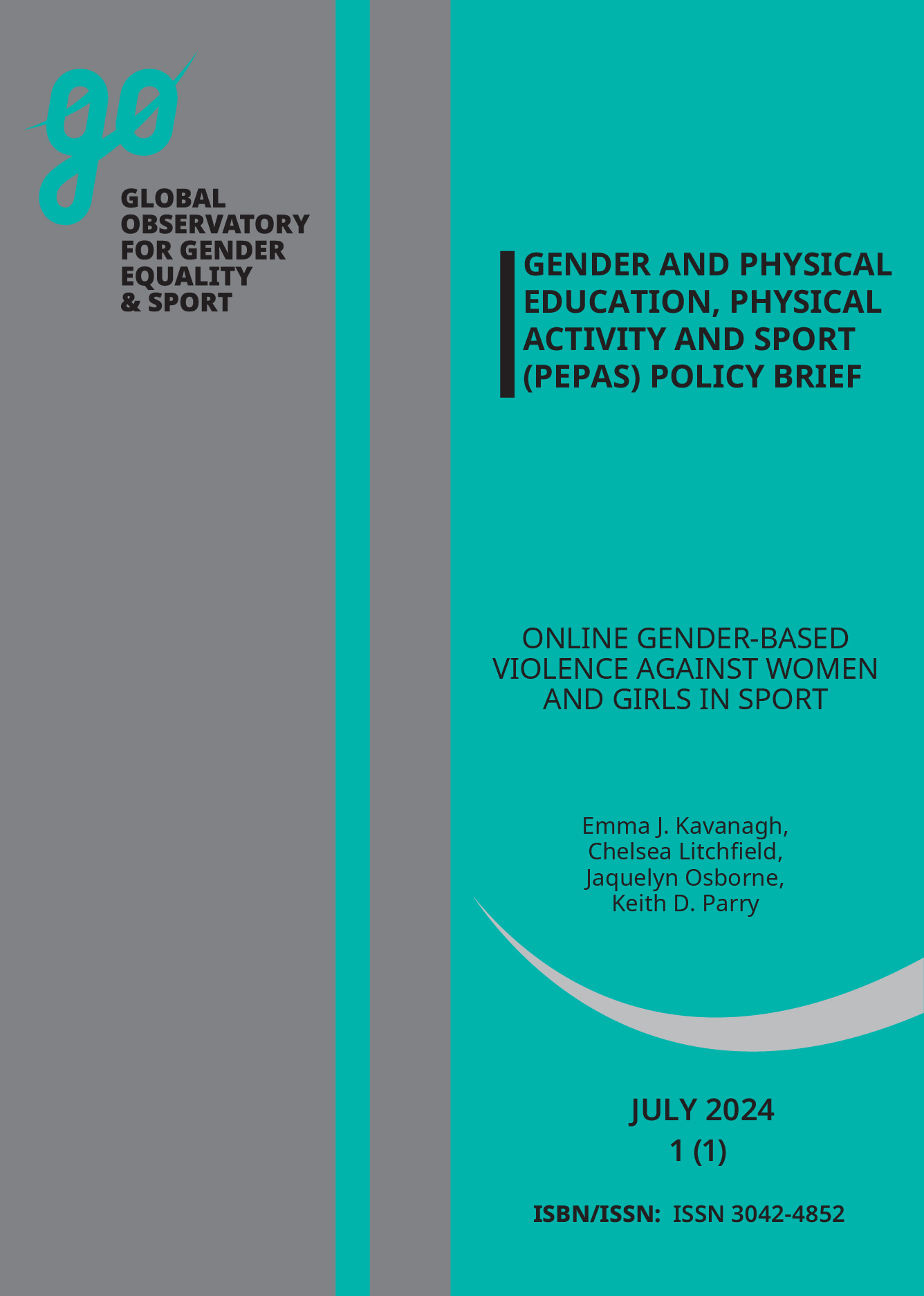Policy Brief Series
Gender Equality and Physical Education, Physical Activity and Sport Policy Brief Series
Policy makers are often required to make quick and informed decisions to respond to challenges within the Sport, Physical Activity and Physical Education (PEPAS) ecosystem. Policy briefs play an essential role by providing evidence-based and actionable recommendations to shape policy decisions and initiatives. The Global Observatory for Gender Equality & Sport publishes policy briefs on a range of topics and challenges focused on gender equality in PEPAS contexts. Each policy brief provides concise and evidence-based recommendations to policy actors across inter-government, government and sport sectors. Each Policy Brief is reviewed by at least two expert reviewers who are external to the Global Observatory and prepared for publication by the Global Observatory.
About the GO’s Policy Brief Series
Within the broader mission of the Global Observatory, policy brief series present evidence to advance policy on a range of topics in PEPAS that affect women and girls in all their diversity. It is well acknowledged that concise and relatable data and research backed evidence is a great enabler for policy influence and informed engagement.
As noted in the MINEPS VII outcome documents, the need for high-quality data and research is urgent to ensure countries and governments have accessible and relevant evidence to accelerate policy action tasked with addressing inequalities in PEPAS. Yet, existing research and evidence is often limited in its ability to reach policy makers in relevant formats that can present actionable policy recommendations to government audiences. Moreover, not all countries have ongoing and accessible engagement with research and evidence related to PEPAS to inform their policy visions and work. Therefore, despite the research being conducted and outputs being produced, it does not always reach and inform local and global agendas that have the potential to coordinate action to address inequalities in PEPAS.
The GO’s policy brief series aim to address this gap by enhancing knowledge translation and communication between sectors. It aims to facilitate connection between researchers and policy makers to enhance the availability of information and timely reccomendations on policy issues that are pertinent at present and to draw attention to issues that require further action.
The GO’s Policy Brief Series aim to:
1. Identify key policy issues, highlighting emerging trends and current evidence, challenges and opportunities on a specific issue and context among policy makers in UN, government, intergovernmental and organizational settings.
2. Communicate evidence-based insights and concrete step-by-step recommendations in relevant formats to policy makers and that can guide UN Bodies, Intergovernmental bodies, Sport Federations, government finance and planning departments, government PEPAS, local government and health portfolios, academic, advocacy, and other research actors to address specific issues in PEPAS.
3. Providing governments and organizations with evidence-based justifications for legislative or institutional changes to address gender equality in PEPAS.
4. Advise on funding and investment, guiding resource allocation toward evidence-based gender equality practices.
5. Facilitate cross sector collaborations, including increased engagement between researchers and policy makers to further policy action.
6. Align to international frameworks, commitments, declarations and conventions such as UN Sustainable Development Goals (SDGs), Convention on the Elimination of All Forms of Discrimination (CEDAW), the Beijing Platform for Action among others.
Policy Brief Series 2024-2026: Gender-Based Violence and Violence Against Women and Girls and PEPAS
The 2024-2026 Policy Brief Series focuses on the topics within the thematic of Gender Based Violence, in particular, Violence against Women and Girls in Physical Education, Physical Activity, and Sport contexts.
The policy brief series adopts an intersectional and inclusive approach to gender equality to address the multiple forms of discrimination – based on gender along with other intersections such as (but not limited to) ethnicity, sexual orientation, socioeconomic status, nationality, faith – that women in PEPAS may face. The Global Observatory defines inclusive gender equality as working toward gender equality from a perspective that makes visible and includes people who have been marginalized and excluded from sport for varying and intersectional discriminations.
Policy Brief 1
Online Gender-Based Violence Against Women and Girls in Sport
Abstract
Online gender-based violence (GBV) can include sexually explicit language, unpleasant remarks or social criticism connected to gender, gendered-microaggressions, sexual allusions, exaggerated rape and murder threats, and stalking. Violent interactions may be text or image-based and can target individuals directly and/or those closest to them.
Online GBV in sport curtails the rights of women and girls, impacts on their liberty, and poses a significant threat to their health, safety and wellbeing. The aim of this policy briefing is to share research perspectives on online gender-based violence against women and girls in sport and to make recommendations for global sporting organizations, online platforms, and governments who have a moral obligation to foster safer online communities.
Authors: Emma J. Kavanagh¹, Chelsea Litchfield², Jaquelyn Osborne², Keith D. Parry¹
¹Department of Sport and Event Management, Bournemouth University, Poole, UK
²School of Allied Health, Exercise and Sports Sciences, Charles Sturt University, Bathurst, Australia
Citation: Kavanagh, E.J., Litchfield, C., Osborne, J., and Parry, K.D. (2024). Online Gender-Based Violence Against Women and Girls In Sport. Gender and PEPAS Policy Brief Series. 1(1) Global Observatory for Gender Equality & Sport: Lausanne
Publication date: 15.07.2024
Publisher: Global Observatory for Gender Equality & Sport
ISBN/ISSN: ISSN 3042-4852
Submit a Policy Brief
We invite proposals for submissions from researchers across various disciplines including but not limited to sociology, economics, political science, law, and sport science, and from around the world.

